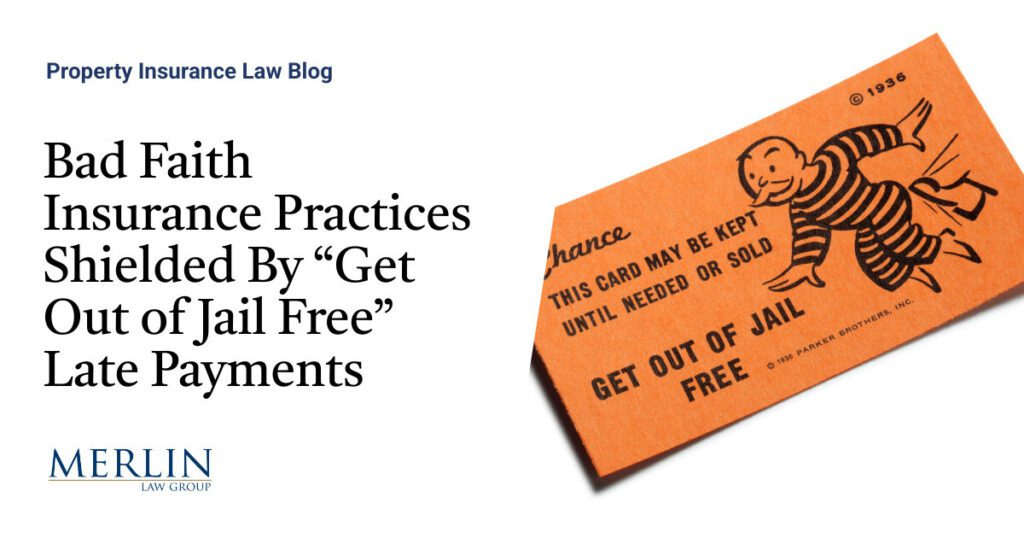Bad Faith Insurance Practices Shielded By “Get Out of Jail Free” Late Payments

Imagine a world where breaking the rules carries no real consequences. That’s the reality policyholders face when insurance companies delay or wrongfully deny claims, only to make a late payment after an appraisal and walk away without any real accountability. Last week’s decision in Mirelez v. State Farm Lloyds 1 is yet another example of Texas law now allowing insurers to escape responsibility for bad faith conduct, so long as they eventually cut a check—even if that check comes after months or years of financial strain and frustration for the policyholder.
Joseph Mirelez’s case should have been a straightforward example of wrongful claim handling. He suffered property damage due to wind and hail, but when he filed a claim, State Farm denied payment, asserting that the damage fell below his deductible. Even after he provided contractor estimates and photographic proof of the damage, State Farm refused to pay. Left with no choice, Mirelez invoked the policy’s appraisal process. The appraisal panel ultimately determined that his damages were significantly higher than what State Farm had claimed. Only after the appraisal award was issued—long after Mirelez had been forced to fight for what he was owed—did State Farm finally issue a payment for the award amount plus interest.
But here’s the problem: by the time State Farm paid, the damage had already been done. Mirelez had endured financial hardship, legal expenses, and months of unnecessary delay. Yet, when he sought to hold State Farm accountable for its bad faith claims handling under Texas Insurance Code Chapter 541, the courts shut him down. Both the district court and the Fifth Circuit ruled that because State Farm ultimately paid the appraisal award and added interest, Mirelez had no grounds to pursue additional damages. Under Ortiz v. State Farm Lloyds, 2 Texas law shields insurers from bad faith liability unless the policyholder can prove an independent injury beyond the delayed payment itself. Since Mirelez had no claim for damages other than the benefits he was originally owed, his case was dismissed.
This ruling highlights a major flaw in the way Texas courts handle bad faith insurance claims. It sends a clear message to insurers: if you eventually pay what you owe—no matter how long you drag it out—you can avoid any real consequences for wrongful claim practices. The result is an uneven playing field where policyholders suffer through financial uncertainty, property deterioration, and legal battles while insurance companies use delay tactics as a calculated business strategy.
The logic behind shielding insurers from bad faith liability after a late payment is deeply flawed. When a policyholder files a legitimate claim, they do so because they need the money to repair their home, replace their belongings, or recover from a loss right away. A wrongful denial or prolonged delay doesn’t just create inconvenience—it can force business owners and families into financial distress, leave structures in disrepair, and disrupt lives. It undermines the reason why Americans purchase insurance in the first place. The fact that an insurer can later “fix” the situation with a payment—including interest—doesn’t erase the harm caused by the initial refusal to pay or roadblocks causing delay.
If a bank wrongly foreclosed on someone’s home and later reversed course by offering the homeowner compensation plus interest, that wouldn’t undo the damage of being wrongfully evicted. Yet, in the insurance world, this kind of harm is routinely excused under the guise of legal precedent. Texas courts, citing cases like Ortiz and Navarra v. State Farm Lloyds, now consistently rule that once a payment is made through appraisal, policyholders have no further recourse—unless they can prove an independent injury. But what greater independent injury exists than being forced to battle your own insurance company just to get what was owed in the first place?
This legal loophole isn’t just bad for individual policyholders; it’s bad for society. It encourages property insurers to engage in delay tactics and wrongful denials without fear of meaningful repercussions. The principle of insurance is simple: people pay premiums expecting fair, fast and good faith treatment and that their insurer will be there supporting them when disaster strikes. But when insurers manipulate the system to delay payments, underpay claims and then can avoid bad faith penalties, it undermines the entire purpose of insurance.
Policyholders shouldn’t have to choose between accepting wrongful denials or embarking on a drawn-out legal fight just to receive fair treatment. Courts need to recognize that late payments don’t erase bad faith conduct, and lawmakers should consider reforms that hold insurers accountable for wrongful delays, regardless of whether they eventually pay an appraisal award. Otherwise, insurers will continue treating wrongful claim denials as nothing more than a minor inconvenience—one that can always be “fixed” with a check long after the damage has been done.
As I have previously noted, Timely Payment of an Appraisal Award Does Not Mean the Claim Was Handled in Good Faith. States other than Texas have refused to buy into the idea that, as discussed in Colorado Insurance Companies Do Not Have a “Get Out of Jail Free Card” For Delayed and Underpayments Following Appraisal.
For now, insurance companies hold a powerful “Get Out of Jail Free” card in Texas. The question is: how long will lawmakers allow them to keep playing it if the common law does not prevent wrongful claims conduct?
Thought For The Day
“It takes 20 years to build a reputation and five minutes to ruin it.”
—Warren Buffett
1 Mirelez v. State Farm Lloyds, No. 24-20099, — F.4th —, 2025 WL 415330 (5th Cir. Feb. 6, 2025).
2 Ortiz v. State Farm Lloyds, 589 S.W.3d 127 (Tex. 2019).



